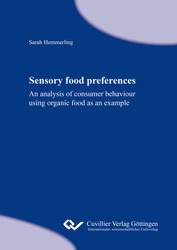| Areas | |
|---|---|
| Serie de libros (97) |
1381
|
| Nachhaltigkeit |
3
|
| Gesundheitswesen |
1
|
| Letra |
2370
|
| Ciencias Naturales |
5407
|
| Matemática | 228 |
| Informática | 319 |
| Física | 980 |
| Química | 1364 |
| Geociencias | 131 |
| Medicina humana | 243 |
| Estomatología | 10 |
| Veterinaria | 108 |
| Farmacia | 147 |
| Biología | 835 |
| Bioquímica, biología molecular, tecnología genética | 121 |
| Biofísica | 25 |
| Nutrición | 45 |
| Agricultura | 1005 |
| Silvicultura | 201 |
| Horticultura | 20 |
| Ecología y conservación de la tierra | 148 |
| Ciencias Ingeniería |
1798
|
| General |
98
|
|
Leitlinien Unfallchirurgie
5. Auflage bestellen |
|
Erweiterte Suche
Sensory food preferences (Tienda española)
An analysis of consumer behaviour using organic food as an example
Sarah Hemmerling (Autor)Previo
Indice, PDF (100 KB)
Lectura de prueba, PDF (690 KB)
This dissertation intends to investigate consumer behaviour with a special emphasis on the influence of sensory food attributes and consumers’ preferences for these. It highlights the relevance of consumers’ sensory perception and preferences for the research of food choices and indicates the need for a stronger integration of sensory analysis in food marketing research. This research concern is implemented by using the organic food market as an example that, due to its quality and premium orientation, offers great potentials for differentiation strategies based on taste and other sensory properties. A comprehensive and systematic literature review of international research on organic food consumption behaviour discovers the role that sensory aspects had played until now and reveals the need for more sensory-oriented consumer research. Based on this, in the context of six European organic markets, consumers’ stated preference and actual sensory preferences are explored, shedding light on the role they play in consumption behaviour. In addition to sensory preferences, the thesis offers insights into a further perceptual construct that appears to be relevant for consumer behaviour, namely the perceived authenticity of traditional food specialties.
The concluding section presents the main findings of the six research articles cumulated in the thesis and discusses them with regard to implications for marketing and research. Moreover, it evaluates the limitations of the included studies from which further need for research is derived.
| ISBN-13 (Impresion) | 9783954047819 |
| ISBN-13 (E-Book) | 9783736947818 |
| Formato | A5 |
| Idioma | Inglés |
| Numero de paginas | 218 |
| Laminacion de la cubierta | Brillante |
| Edicion | 1. Aufl. |
| Lugar de publicacion | Göttingen |
| Lugar de la disertacion | Göttingen |
| Fecha de publicacion | 29.10.2014 |
| Clasificacion simple | Tesis doctoral |
| Area |
Agricultura
|
| Palabras claves | Sensory food preferences, organic food, consumer behaviour, food choice |
| URL para pagina web externa | http://www.uni-goettingen.de/de/307003.html |








